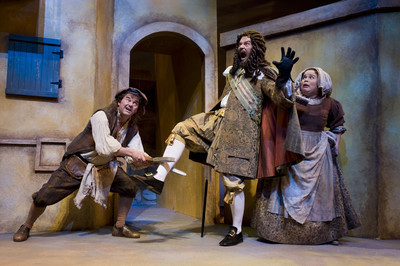Moliere’s ‘School for Wives’ both humorous, irresistible
Timothy Castro performs in Moliere's hilarious "The School for Wives" with a perpetual smirk -- that is, when he's not weeping or cursing the fates or grimacing in emotional pain.
As Arnolphe, Castro is a homely, middle-age man who foolishly thinks he has his future all worked out. He's been cultivating his ward since she was 4 years old to make sure she will become for him the perfect wife: naive, isolated, uneducated, and knowing no man but he. (It's "Sweeney Todd" set to yuks.)
Of course this being Moliere, things don't turn out quite as the poor chap has planned. The blossoming Agnes (the attractively vulnerable Betsy Mugavero) falls in love with the first young man who happens by her tower (Kevin Killer). So, naturally, the remainder of the evening involves the desperate attempts of Arnolphe to keep them apart. Guess who wins.
If the plot sounds old hat, the author's treatment isn't. The script is stuffed with humorous philosophies, irresistible running gags (such as bumbling servants who argue about who's gong to answer the door), and a collection of fools that audiences would be foolish to resist.
Director Robert Cohen finds the right tone for all this inspired nonsense. He achieves a breezy, Comedia dell'arte feel, while still allowing enough reality to get us emotionally involved in the story. We desperately want these young lovers to hook up.
Castro beautifully exaggerates his character's meanness, mugging shamelessly but with enormous discipline. You never tire watching his face. The pleasure of the action is in seeing it through his eyes.
The supporting players are a nonstop parade of talent, from the puffy Chrysalde (Dennis Elkins), forever offering advice, to the sensually stout Lillian Castillo as the fearful, gossipy, earthy cook.
The set and costumes create a lyrical, cartoonish physical environment that immediately puts us in the mood for silliness.
Some might object to Ranjit Bolt's translation which, mistakenly I think, interweaves the feel of 17th-century language with modern idioms. It jolts you out of the play to hear words like "friggin' " in the middle of eloquent verse.
On the other hand, Bolt often provides the punch lines with the power and rhythms they demand. When one character has lost everything, his victor tries to console him with, "Don't forget. We need days like this, or we get cocky."
You just can't not laugh.
what: Utah Shakespearean Festival
when: Mondays-Saturdays (through Aug. 30)
where: Cedar City, Utah
tickets: $22-$60 (800-752-9849)
REVIEW
what: "The School for Wives"
where: Randall L. Jones Theatre; Cedar City, Utah
tickets: $30-$60 (800-752-9849)
grade: A















